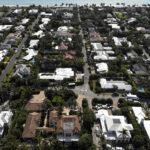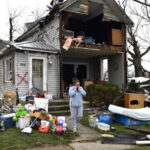As homeowners jam Florida stores to take advantage of the state’s tax-free sales tax holiday and other stores announce “matching” programs to provide additional discounts, professional insurance associations and agencies polled for an article in the June 6 issue of Insurance Journal Southeast, are taking the threat seriously and making every effort to prepare members for whatever crises the hurricane season brings.
Several Florida groups, including the Florida Association of Insurance Agents and the Professional Insurance Agents of Florida say they have prepared members and policyholders for what could be another record hurricane season.
“What we learned from the 2004 hurricane season is that agents who implemented the practices outlined in our Catastrophe Guide (or something very similar) fared remarkably better than those that did not,” Jeff Grady, FAIA president and CEO explained.
FAIA mailed a letter to its members urging them to contact policyholders, provide them with a list of 800-numbers so they can file claims directly with their insurers and let them know an updated list is available at www.faia.com. PIA of Florida provided its members with a Hurricane Preparedness CD outlining pre- and post-hurricane precautions and procedures.
FAIA emphasized hurricane preparedness and encouraged members to have generators standing by for power interruptions and to install offsite computer backup systems.
FAIA’s 21-member Catastrophe Claims Advisory Council, directed by Wilford W. Ghioto, chairman, is spearheading a campaign to encourage members to notify policyholders about toll-free numbers they can call during catastrophe’s to file claims directly with the companies holding their insurance policies.
Ghioto said that FAIA members are now receiving letters telling them that with the approach of the hurricane season it is time to get serious.
“They shouldn’t wait until a storm threatens, now’s the time for agents to send this information out to their clients,” Ghioto explained. “At the same time agents need to formulate their own hurricane plan, buy a generator and get prepared for what could be an uncertain hurricane season.”
There is a comprehensive “Hurricane Command Post” on FAIA’s Web site, www.faia.com, with information continually updated, Jennifer Pitts, FAIA webmaster and a staff coordinator for the Catastrophe Council encourages comments or claim number changes.
Disaster preparedness
After an exhaustive search, FAIA forged an endorsed relationship with Agility Recovery Solutions that provides FAIA members with varying levels of services when the need arises. The association’s strength in numbers allowed for an affordable solution for member agents, big and small.
Agility–an on-site disaster recovery firm receives an up-front monthly fee from FAIA members to cover them in case of a hurricane, windstorm, fire or flood. Agility guarantees to have its equipment in place within 48 hours. Agility bills the agency for all out-of-pocket expenses, most of which are covered by E&O insurance.
PIA of Florida distributes info
A two-part CD, containing vital pre-hurricane and post-hurricane preparedness information was mailed out in early May to agencies that belong to the PIA of Florida. The CD included a comprehensive disaster plan, which PIA of Florida implemented at its Tallahassee offices, including standby generators and hurricane supplies to make it possible for employees to service members throughout even the worst possible catastrophe.
“When the CDs went out we urged all our members to look at the contents right away and prepare for the 2005 hurricane season by following a comprehensive disaster plan,” Mary Frederick, PIA of Florida communications director explained. “It’s critical that agents implement a disaster plan—if agents fail to protect their agencies during a catastrophe, their businesses could fail.”
The information about the disaster plan walks agencies through a checklist describing what they should do before an emergency occurs, such as the importance of computer backups, client and carrier relations and dealing with adjusters.
Pre-disaster information includes: a hurricane supply list, explaining how every business and household should prepare before a hurricane; hurricane tips for homeowners, a marketing piece for agents to send out to policyholders; and an errors and omissions primer describing how to deal with a catastrophe, and how businesses can be protected from an E&O claim.
Post-disaster information includes 800-numbers for all major insurance companies and the three most popular ACORD forms, to be used only after a member’s area is hit by a major storm, employee rosters and a claims log-in form. According to Frederick, the CD will provide invaluable information for both agents and their clients about pre-storm and post-storm activities.
Alabama agents ‘seasoned’
Members of the Alabama Independent Insurance Agents are seasoned hurricane veteranc. According to Vic McCarley, AIIA executive vice president, members have gone through a number of major hurricanes which preceded Hurricane Ivan.
AIIA prepares and distributes a “Things To Do” publication for its members once it knows they are targeted for a storm. The publication includes information related to emergency numbers, claims advice and offers to assist them.
“When Hurricane Ivan came through we contacted just over 100 agencies in the counties affected within 24 hours of landfall to see what assistance they needed, and all of them had everything they needed,” McCarley explained. “Many had generators left over from previous storm duty. Almost all of them had ordered pre-printed loss notices from their carriers to make sure they had them in case they had no computers.”
Was this article valuable?
Here are more articles you may enjoy.

 Jury Awards $80M to 3 Former Zurich NA Employees for Wrongful Termination
Jury Awards $80M to 3 Former Zurich NA Employees for Wrongful Termination  Florida’s Home Insurance Industry May Be Worse Than Anyone Realizes
Florida’s Home Insurance Industry May Be Worse Than Anyone Realizes  DraftKings Sued Over ‘Risk-Free’ Bets That Were Anything But
DraftKings Sued Over ‘Risk-Free’ Bets That Were Anything But  Gallagher: Global Insured Natural Disaster Claims Again Dominated by Severe U.S. Storms
Gallagher: Global Insured Natural Disaster Claims Again Dominated by Severe U.S. Storms 